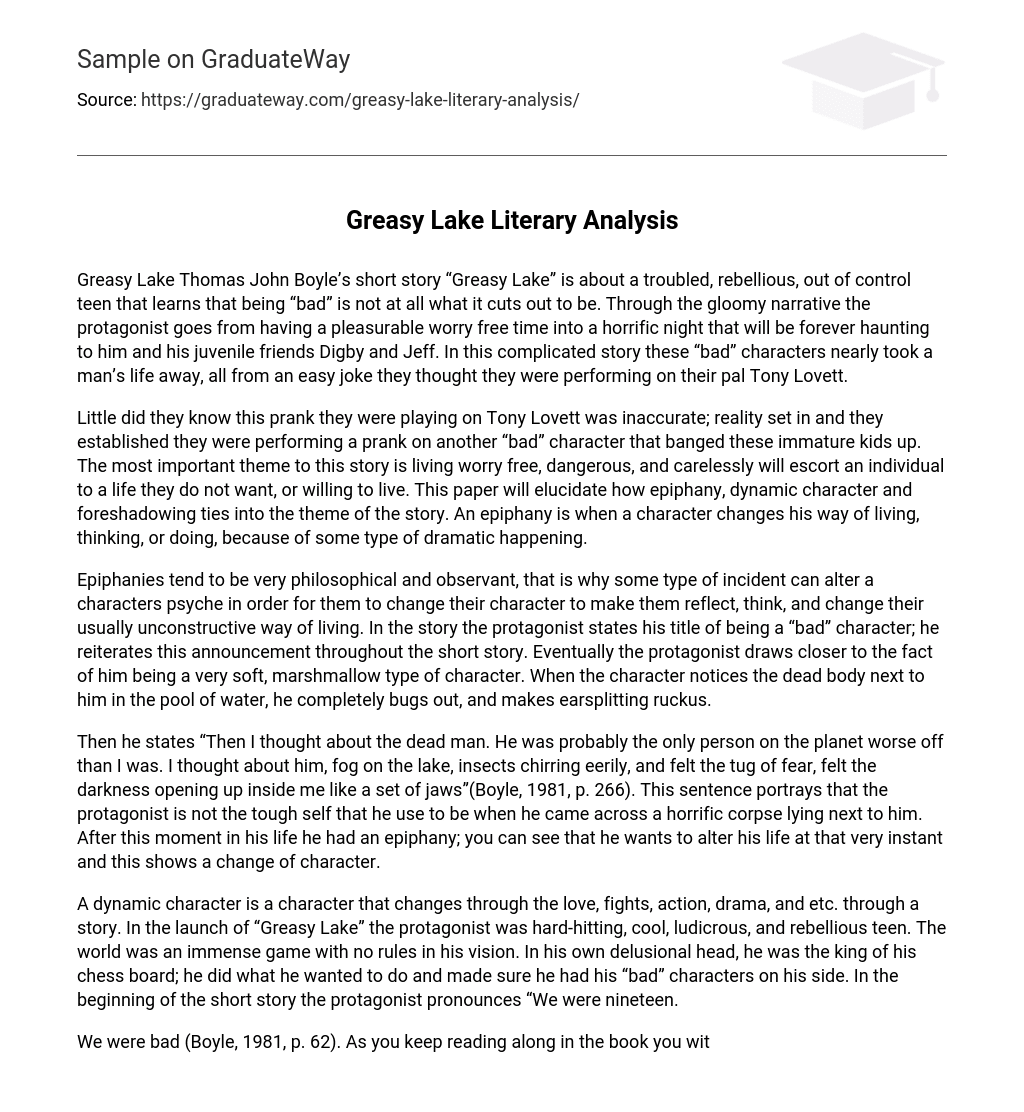Greasy Lake Thomas John Boyle’s short story “Greasy Lake” is about a troubled, rebellious, out of control teen that learns that being “bad” is not at all what it cuts out to be. Through the gloomy narrative the protagonist goes from having a pleasurable worry free time into a horrific night that will be forever haunting to him and his juvenile friends Digby and Jeff. In this complicated story these “bad” characters nearly took a man’s life away, all from an easy joke they thought they were performing on their pal Tony Lovett.
Little did they know this prank they were playing on Tony Lovett was inaccurate; reality set in and they established they were performing a prank on another “bad” character that banged these immature kids up. The most important theme to this story is living worry free, dangerous, and carelessly will escort an individual to a life they do not want, or willing to live. This paper will elucidate how epiphany, dynamic character and foreshadowing ties into the theme of the story. An epiphany is when a character changes his way of living, thinking, or doing, because of some type of dramatic happening.
Epiphanies tend to be very philosophical and observant, that is why some type of incident can alter a characters psyche in order for them to change their character to make them reflect, think, and change their usually unconstructive way of living. In the story the protagonist states his title of being a “bad” character; he reiterates this announcement throughout the short story. Eventually the protagonist draws closer to the fact of him being a very soft, marshmallow type of character. When the character notices the dead body next to him in the pool of water, he completely bugs out, and makes earsplitting ruckus.
Then he states “Then I thought about the dead man. He was probably the only person on the planet worse off than I was. I thought about him, fog on the lake, insects chirring eerily, and felt the tug of fear, felt the darkness opening up inside me like a set of jaws”(Boyle, 1981, p. 266). This sentence portrays that the protagonist is not the tough self that he use to be when he came across a horrific corpse lying next to him. After this moment in his life he had an epiphany; you can see that he wants to alter his life at that very instant and this shows a change of character.
A dynamic character is a character that changes through the love, fights, action, drama, and etc. through a story. In the launch of “Greasy Lake” the protagonist was hard-hitting, cool, ludicrous, and rebellious teen. The world was an immense game with no rules in his vision. In his own delusional head, he was the king of his chess board; he did what he wanted to do and made sure he had his “bad” characters on his side. In the beginning of the short story the protagonist pronounces “We were nineteen.
We were bad (Boyle, 1981, p. 62). As you keep reading along in the book you witness numerous occasions where the protagonist has become a “normal” person, which he would probably consider to be a coward. A few times were when he had an epiphany in the water with the lifeless man. The second was when two young females approached him and his bad characters, asked him if he wanted to party and he stared at them blankly until Digby broke the utter silence. When these young ladies had asked them this foolish question he wanted to break down and cry.
It is evident that this boy has changed over as a character, he once was a tough male, but from the epiphanies and experiences he went through it changed his act, that is why he is a dynamic character. Symbolism is anything that portrays something else indirectly. Symbolism in the story is used when the story first starts off, when the protagonist overly states that he is “bad”. The protagonist states this claim so much that it begins to become fake. If an individual was really “bad” he would not state that he was a million times, people who are truly “bad” would not brag about it continuously.
The protagonist stating that he is exceedingly “bad” continuously symbolizes that he is insecure, and has to reassure himself that he is a “bad” character because he doesn’t truly believe he is one. The protagonist says “We drank gin and grape juice, Tango, Thunderbird, and Bali Hai. We were nineteen. We were bad. We read Andre Gide and struck elaborate poses to show that we didn’t give a shit about anything” (Boyle, 1981, p. 261). The character tries so hard to be “bad”, which symbolizes that he is not in reality.
Trough the troubles and tribulations of this young immature teen it gives off a theme that someone can really live by, living worry free, dangerous, and carelessly will escort an individual to a life they do not want, or willing to live. All of my literary analysis shows how symbolism, dynamic character, and epiphany all tie into the theme and help generate it. People were put on this Earth to love positive, fulfilling lives, not ones wasted on drugs and alcohol. This stories message will carry on, and help others realize the paramount ways of living.





